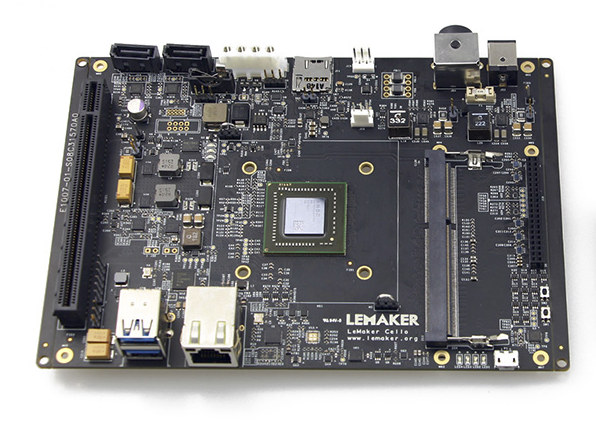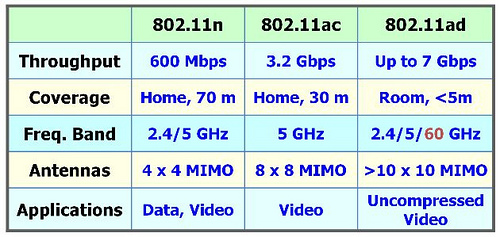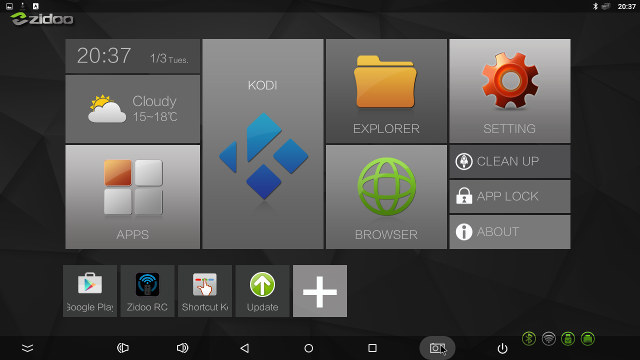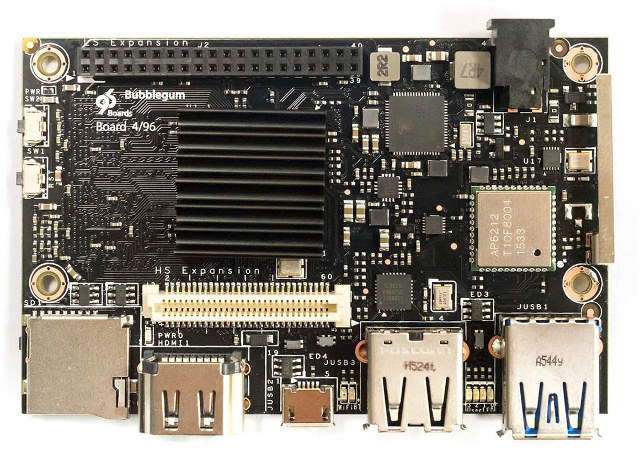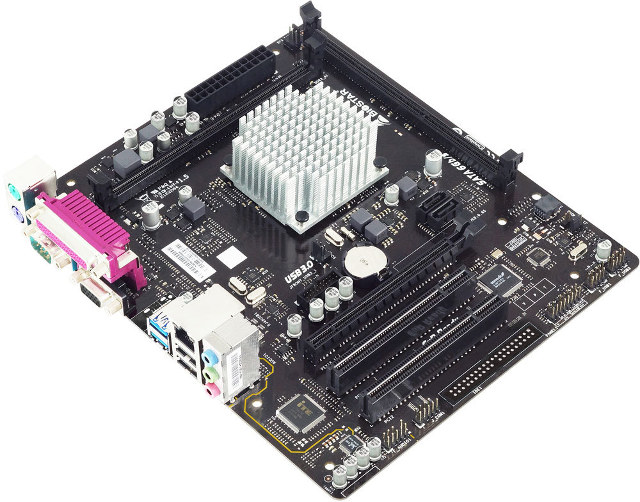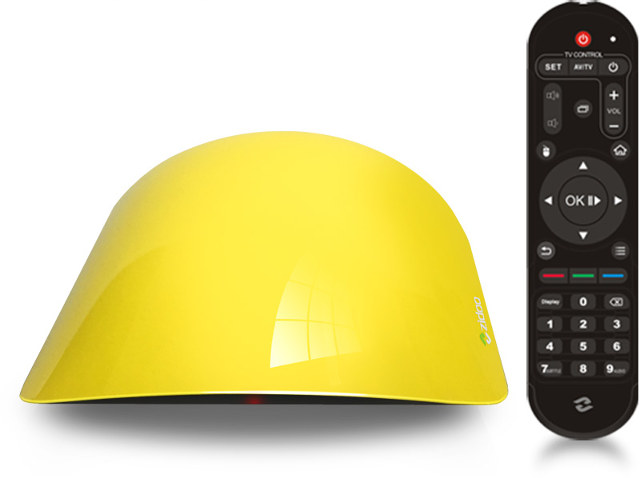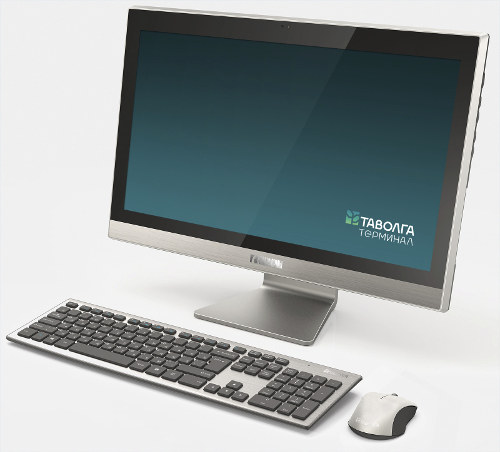There are two versions of Linaro’s 96Boards specifications the Consumer Edition (CE) and the Enterprise Edition (EE) with higher hardware requirements, and while several boards mostly compliant with 96Boards CE are available such as DragonBoard 410c and Hikey boards, the only board announced to be compliant with 96Boards EE specifications was AMD Huskyboard based on Opteron A1100 series processor and is yet to be available for sale. LeMaker has now designed a similar EE boards called Cello. LeMaker Cello board specifications: Processor – AMD Opteron A1120 quad core Cortex A57 processor @ 1.7 GHz with 2MB L2 cache, 8MB L3 cache System Memory – 2x DDR3 SO-DIMM sockets Storage – 2x SATA 3.0 ports, micro SD slot Connectivity – 1x Gigabit Ethernet RJ45 port USB – 2x USB 3.0 ports Expansions x16 PCIe G3 slot 40-pin Low Speed (LE) expansion header Debugging – micro USB port for console access, 10-pin […]
The First Devices and Routers with WiFi 802.11ad Delivering Up 7Gbit/s Transfer Rates at 60 GHz Will Be Available This Year
802.11ad is the latest and fastest WiFi standard working in the 60 GHz band and delivering up to 7 Gbit per second data transmission rates. The 60 GHz frequency band offers both advantages and disadvantages because it does not penetrate through walls nor water, meaning it can only be used within a room limiting the range, but at the same time it’s more secure since it cannot be snooped from the outside, and for people who worry about health effects it does not penetrate the human body. 802.11ad routers will also be able to switch to 2.4 and 5.0 GHz frequency bands in order to go through walls. The table above nicely summarize the key features of 802.11ad over 802.11ac and 802.11n, however the throughput row shows the theoretical maximum throughput, but in practice, using 802.11ac as example, clients are often limited to 433 or 866 Mbps, and distance and […]
Zidoo X5 TV Box Review
Zidoo X5 is TV box running Android 5.1 powered by Amlogic S905 processor like so many competing products on the market. I’ve already listed the full specs and taken pictures of the Zidoo X5 case and hardware, so today we’ll see how the device performs against the many Amlogic S905 mini PCs I’ve reviewed so far, and if it fixes some common bugs. First Boot and First Impressions Before starting the media player I’ve connected all cables and made sure to fill the two USB ports with a bunch of peripherals including a 1TB hard drive, keyboard, webcam, and so on. There’s no power button, and the device boots immediately once you connect it to the mains, with a standard boot time being around 40 seconds. The company has used the exact same Zidoo launcher as in their X6 Pro TV box, however they’ve decided to use a 1280×720 framebuffer, […]
$89 Bubblegum-96 96Boards Development Board is Powered by Actions Semi S900 64-Bit Processor with 2GB RAM
Bubblegum-96 development board was unveiled nearly a year ago, and finally the Actions Semi S900 quad core Cortex A53 board compliant with Linaro’s 96Boards specifications will soon go on sale for $89. Most 96Boards development boards take a while to come to market, likely due to the software requirements. uCRobotics Bubblegum-96 specifications: SoC – Actions Semi S900 quad core Cortex A53 @ up to 1.8 GHz with PowerVR G6230 GPU @ 600 MHz System Memory – 2GB LPDDR3 @ 800 MHz Storage – 8 GB eMMC 4.5 flash + micro SD v3.0 socket Video Output – HDMI 1.4 with HDCP up to 4K, MHL 2.1 up to 4K via USB connector Connectivity – Wi-Fi 802.11 b/g/n, Bluetooth 4.0 USB – 1x USB 2.0 port, 1x USB 3.0 port, 1x micro USB 2.0 port Expansion 40-pin LS (Low Speed) Expansion connector – UART, I2C, 12x GPIOs, SPI, PCM, 1.8V, +5V, GND… […]
BIOSTAR Introduces 4 Motherboards based on Intel “Braswell” Celeron J3060 and J3160 Processors
Intel recently announced updates to Intel Celeron N3050 & N3150, and Pentium N3700 processors, confusingly called J3060, J3160 and J3710 and offering higher burst frequencies compared to their predecessors. BIOSTAR has now also updated their Motherboard catalog with four models based on Celeron J3060 and J3160 dual and quad core processors. The four motherboards key differences are listed as follows: BIOSTAR J3060NH Mini-ITX motherboard with Celeron J3060, SO-DIMM slot, and HDMI + VGA BIOSTAR J3160NH Mini-ITX motherboard with Celeron J3160, SO-DIMM slot, and HDMI + VGA BIOSTAR J3160MP Micro-ATX motherboard with Celeron J3160, DIMM slots, and VGA + external printer & COM ports BIOSTAR J3160MD Micro-ATX motherboard with Celeron J3160, DIMM slots, and DVI + VGA + internal printer port But the rest of the specifications are very similar between all 4 boards: SoC Intel Celeron J3060 dual core processor @ 1.6/2.48 GHz with Intel HD graphics 400 with 12EU @ 320/700 MHz […]
Zidoo X1 II Android Media Player Powered by Rockchip RK3229 SoC Supports 4K 10-bit H.264 & H.265 Videos
Rockchip RK3229 is a low cost 4K SoC that supports 10-bit H.265 up to 4K @ 60 fps and 10-bit H.264 and VP9 up to 4K @ 30 fps, and found in inexpensive TV boxes such as MXQ 4K. Zidoo has decided to design a new product based on the processor, with the same enclosure as Allwinner H3 based Zidoo X1 TV box, and aptly called Zidoo X1 II. Zidoo X1 II specifications: SoC – Rockchip RK3229 quad core ARM Cortex A7 processor @ 1.5 GHz with ARM Mali-400MP2 System Memory – 1GB DDR3 Storage – 8GB eMMC flash + micro SD card slot up to 32GB Video & Audio Output – HDMI 2.0 up to 4K2K @ 60 fps, and 3.5mm AV output (composite) Connectivity – 100Mbps Ethernet, 802.11 b/g/n WiFi and Bluetooth 4.0 USB – 2x USB 2.0 host ports Misc – IR receiver Power Supply – 5V/2A […]
Embedded Linux Conference 2016 and OpenIoT Summit 2016 Schedule
The Embedded Linux Conference 2016 and the OpenIoT summit 2016 will take place on April 4 – 6, 2016 in San Diego, California, and over 800 attended will meet including kernel & system developers, userspace developers, and product vendors. The Linux Foundation has recently published the schedule, so I’ve had a look at some of the talks, and designed my own virtual schedule to find out more the current development focus although I won’t attend. Monday April 4 10:40am – 11:30am – Linux Connectivity for IoT by Marcel Holtmann, Intel OTC There are many connectivity solutions that available for IoT. For example Bluetooth Low Energy, 802.15.4, Zigbee, OIC, Thread and others. This presentation will provide and overview of the existing technology and upcoming standard and how they tie into the Linux kernel and its ecosystem. 11:40 – 12:30 – BoF: kernelci.org: A Million Kernel Boots and Counting by Kevin Hilman, […]
Tavolga Terminal TP-T22BT Debian 8 All-in-One Computer is Powered by Baikal-T1 MIPS Processor
A Russian company called Baikal Electronics announced it was working on Baikal T1 dual core MIPS P5600 to provide an alternative to US based Intel and AMD processor last year, not too long after Edwards Snowden revaluations about the NSA malpractices. Good progress has been made as T-Platforms has now launched Tavolga Terminal TP-T22BT All-in-One computer with a 21.5″ display, up to 8 GB RAM, and the Baikal T1 processor running Debian 8. TP-T22BT specifications (derived from product brief in Russian): Processor – Baikal dual core MIPS 5600 processor @ 1.0 GHz with 1MB L2 cache GPU – Silicon Motion SM750 GPU with 16MB video memory, 2D graphics acceleration System Memory – 2 to 8GB DDR3 Storage – Optional 8GB NAND flash, optional 8GB SSD, and optional 2.5″ SATA drive (Baikal-T1 has a built-in SATA interface) Display – 21.5″ IPS Full HD (1920×1080) display with LED backlight Audio – PCM2912A […]


